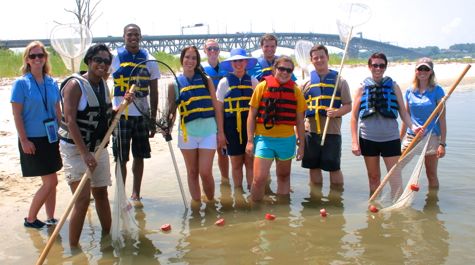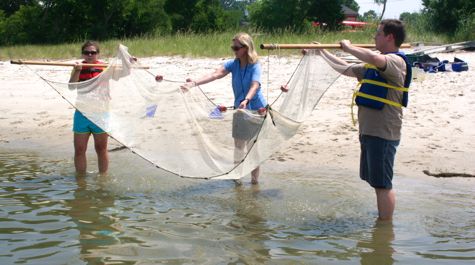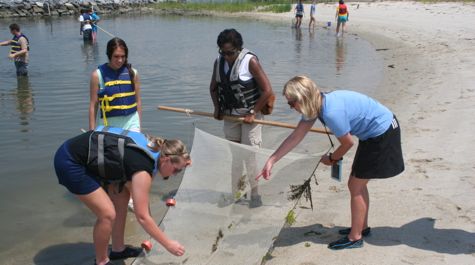Congressional interns visit VIMS
Summer interns from the Virginia offices of Senator Mark Warner and congressmen J. Randy Forbes and Scott Rigell visited the Virginia Institute of Marine Science on July 18 to learn more about the Institute and efforts by VIMS researchers to identify and address the many challenges that threaten the health of Chesapeake Bay and the coastal ocean.
The visit was initiated by Denise Goode, Director for Senator Warner’s Hampton Roads Regional office in Norfolk. She says, “We like to introduce the Senator’s interns to different parts of the region, and were excited by the opportunity to visit Gloucester Point and VIMS so that they could learn about Virginia’s beautiful marine areas and wildlife, as well as the science that’s being done to help sustain these resources.”
The interns—Jennifer Brown, Samantha Hughes, Reilly Poppert, and Rachel Reon (Rep. Forbes-4th District); Wallace Gram and Daniel Harrison (Rep. Rigell-2nd District); and Rosalyn Broad (Senator Warner)—began their visit by touring the lab of Associate Professor Mike Unger, who described his efforts to develop antibody-based biosensors for quickly and inexpensively detecting marine pollutants.
“The interns asked very thoughtful questions,” says Unger, “and seemed to have a good understanding of the historic problems with marine pollution in Virginia. I enjoyed talking with them about our studies of polycyclic aromatic hydrocarbons and other contaminants, and how our biosensors can help guide environmental cleanups in areas like the Elizabeth River.”
Unger says he emphasized that his work is a “microcosm of a lot of what we do at VIMS—conduct basic research to answer applied questions and provide advisory service to regulatory agencies.”
Intern Daniel Harrison, a native of Newport News, says the most interesting thing he took away from his visit with Unger was “learning about how detrimental the paint that we use on the underside of our boats is and how it affects the surrounding ecosystem.”
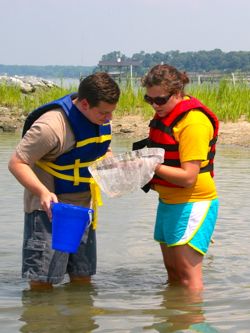
The visit “made me more aware of some of the issues and projects that we have going on in our area,” says Harrison. “I’m now better equipped to help people with their queries and [to understand] how we are working with institutes such as VIMS to not only solve problems but to also encourage and ensure sustainable development.”
The interns also visited the VIMS Teaching Marsh, an acre of restored wetlands that provides resource managers, teachers, and students with a real-world example of how marshes help filter storm water before it can carry contaminants and sediments into near-shore ecosystems like Chesapeake Bay.
Leading the marsh tour was Dr. Kirk Havens, Assistant Director of the Center for Coastal Resources Management at VIMS and Governor Bob McDonnell’s appointed representative to the Chesapeake Bay Program’s Scientific and Technical Advisory Committee. He says the interns were “excited to learn how effective natural systems can be in helping to keep Bay waters clear and healthy,” and “interested in CCRM’s advisory role with local, state, and federal agencies.”
Ms. Diana Williams, community outreach coordinator for Representative Forbes, accompanied the interns on their visit, as did Ms. Sandy Bodenhamer, constituent advocate for Senator Warner. Williams says the visit gave her a greater appreciation for the relationship between constituents and policymakers. “The exchange of information—lawmakers needing research facts; constituents and researchers needing information regarding the lawmaking process—is vital for devising laws and regulations that protect marine resources and also address constituent needs,” says Williams.
Intern Rachel Reon, a native of Smithfield, says she was gratified to discover that VIMS “seeks to help fishers, crabbers, politicians, and researchers find the best ways to both protect Virginia's waters and provide for the residents that live near them. It was refreshing to learn that there is a local group of researchers and scholars from whom both local and national representatives can gather unbiased information.”
The interns’ final activity was a dip in the York River—much welcome given the 103° heat index—where they used seine and dip nets to collect and observe local marine life before returning it to the shallow water.
Susan Maples, VIMS’ public outreach coordinator, says the interns “encountered several species of particular interest to our researchers and restoration experts—eelgrass, which provides nursery and feeding habitat for many Bay creatures; blue crabs and oysters, targets of two of Virginia’s most valuable commercial fisheries; and jellyfish, important players in the Bay food web.”
Intern Wallace Gram, a native of Virginia Beach, says “it was very fun and surprising to see what can be caught even in such shallow water in our region. The trip provided me with a much better knowledge of not only VIMS but of the way that the research there is important to the aquatic world.”
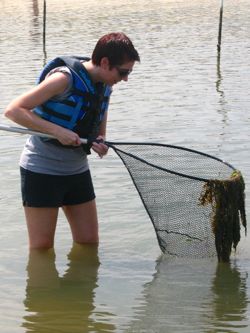
A venerable Capitol Hill tradition, congressional internships offer high school, college, and graduate students an opportunity to experience the legislative process firsthand. Interns work with congressional staff and constituents on a variety of tasks including legislative research, assisting with correspondence, attending hearings and briefings, and general administrative duties. Internships are available both in Washington, D.C. and in local offices around the nation.


